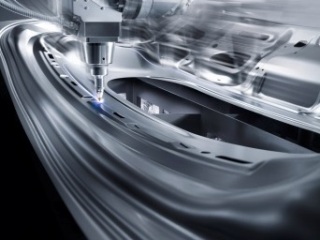Oct 1 2015
Advance engineering in the active Berlin research landscape – Contribution toward "green production" with the laser – Close cooperation with the Ferdinand-Braun-Institut
 Diode-pumped solid-state lasers have long been an indispensable tool in automotive production. Photo: Trumpf
Diode-pumped solid-state lasers have long been an indispensable tool in automotive production. Photo: Trumpf
On October 1, the laser manufacturer TRUMPF will be opening a new subsidiary for the advance engineering of laser diodes in Berlin. In close proximity to, and in close cooperation with, the Ferdinand-Braun-Institut, Leibniz-Institut für Höchstfrequenztechnik (FBH) and other facilities and experts, the company wants to continue expanding its technological and market lead in the high-performance diode laser sector. The laser diode is a key module in today's laser technology, where it is used both as a pump source and as direct diode laser. This close cooperation between industry and research is aimed at making laser systems from TRUMPF even more energy-efficient.
"The Berlin subsidiary, with its initial staff of ten people and the joint ventures emanating from it, is of crucial importance for our development work on this key future topic," says Dr. Berthold Schmidt, head of the central department for Research and Development at TRUMPF. "We're attempting to look ten years ahead here, and to lay the foundations for future applications." Professor Günther Tränkle, Director of the FBH, adds: "We're looking forward to cooperate directly with TRUMPF in the active Berlin research landscape. The joint venture underlines the capability of our FBH teams, as well as the desire, even of major players, to maintain and further extend their market lead with our assistance."
TRUMPF and the FBH have already worked together for several years now on brilliant high-power diode lasers. TRUMPF also funds several PhD studentships at the FBH. "Over the past years our research activities have resulted in numerous patents, enabling further improvements to diode lasers," says Tränkle. "The demand is there and will continue to grow, because the market for laser systems that can process and cut metals is vast." For some materials, such as the tempered steel used in the manufacture of monocoque safety cells in automobiles, the laser is virtually unrivaled, and has long since become an indispensable tool in production.
Dr. Stephan Strohmaier, who runs the TRUMPF subsidiary in Berlin, adds: "For cutting thick sheet metal, a very powerful laser beam is required. Our goal is to efficiently combine ever more laser power inside an ever more brilliant beam – and we're getting better at it all the time." In terms of power density and power-to-light conversion rate, diode lasers from FBH and TRUMPF are currently among the most powerful in the world, and new records are constantly being set in the laboratories. The Berlin TRUMPF subsidiary – which is not only well positioned in the fields of semiconductor laser physics, mounting technology, design, and simulation but also has its own clean room facilities – will be driving the development further.
TRUMPF is continuously improving the energy efficiency of its laser systems in order to enable "green production" for its customers. Diode-pumped solid-state lasers and direct diode lasers, with efficiencies of 30 to 40 percent and higher, are pointing the way. They are not only especially efficient but also save on water and energy, and their compact design makes them material-friendly as well as comparatively cheap. With direct diode lasers, the laser radiation of several diodes is combined using optic elements to create a beam of constantly better focusability. This combination beam, only one tenth of a millimeter in diameter, can then be used to cut metals such as steel in the automotive and shipbuilding industries.